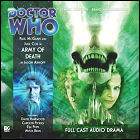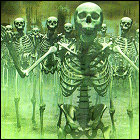 The Doctor takes Mary to the serene planet Draxine, discovering that the planet’s pleasant reputation doesn’t apply to its entire history. The dead walk Draxine again, and one of the planet’s fabled major cities has fallen to the might of the armed skeletons. The Doctor and Mary encounter two escaped prisoners, only to be pursued by both the skeletons and flying security robots, one of which captures the Doctor and whisks him away to be interrogated by the planet’s president. The Doctor learns that the dead are walking the surface of Draxine and have recently taken over the planet’s other most populous city, which lies in ruins in the aftermath of what is said to be a thermonuclear explosion. Mary, cooperating with her captors, continues toward that city, which is also a place the Doctor wants to explore. But this place is the city of the dead, and at the heart of that city is the horrifying living secret of what happened there.
The Doctor takes Mary to the serene planet Draxine, discovering that the planet’s pleasant reputation doesn’t apply to its entire history. The dead walk Draxine again, and one of the planet’s fabled major cities has fallen to the might of the armed skeletons. The Doctor and Mary encounter two escaped prisoners, only to be pursued by both the skeletons and flying security robots, one of which captures the Doctor and whisks him away to be interrogated by the planet’s president. The Doctor learns that the dead are walking the surface of Draxine and have recently taken over the planet’s other most populous city, which lies in ruins in the aftermath of what is said to be a thermonuclear explosion. Mary, cooperating with her captors, continues toward that city, which is also a place the Doctor wants to explore. But this place is the city of the dead, and at the heart of that city is the horrifying living secret of what happened there.
written by Jason Arnopp
directed by Barnaby Edwards
music by Fool Circle ProductionsCast: Paul McGann (The Doctor), Julie Cox (Mary Shelley), David Harewood (President Vallan), Carolyn Pickles (Lady Meera), Eva Pope (Nia Brusk), Mitch Benn (Commander Raynar / Karnex), Joanna Christie (Sherla / Baden / Tox), Trevor Cooper (Captain Maddox / Stennan / Sentries)
Notes: The Doctor mentions that he was once falsely accused of a presidential assassination; the incident in question involved the leader of the Time Lords, as chronicled in the Tom Baker TV story The Deadly Assassin (1976). The Doctor also reminisces about having had a “flying car with a great number plate” (obviously his third incarnation’s Whomobile, though it was never referred to that on screen).
Timeline: after The Witch From The Well and before Storm Warning
LogBook entry and TheatEar review by Earl Green
Review: A story with fairly important developments on the character front but little meat in the story department, Army Of Death is a fairly standard-issue Doctor Who story: Doctor and companion are separated, companion wanders further into danger as Doctor discovers what’s really going on, Doctor reunites with companion and unmasks all of the story’s players, the minions  of evil are put to rights with a satisfying boom, and everyone moves on with their lives as best they can.
of evil are put to rights with a satisfying boom, and everyone moves on with their lives as best they can.
Except for Mary Shelley. In part one, we learn that she has developed a romantic attachment to the Doctor, and yet by part four she is horrified by some of his actions and decisions, failing to comprehend that he’s operating on a scale that’s sometimes beyond human comprehension. It all seems to be winding up for sending Mary home to her own time, except that’s not what happens, leaving all of this character development to be followed up at some unspecified date (or, perhaps, not at all, given that the eighth Doctor releases now seem to be lodged firmly into the “Dark Eyes” timeline).
Army Of Death is a tense and entertaining story, though it’s a case where one would love to have seen it attempted on TV. This one could’ve done with a little bit of Harryhausen.
